Is Coursera worth it?
(this post contains affiliate links & I may earn a few bucks if you buy something).
Question: Is Coursera worth it?
Answer: Coursera might not worth it for some software developers. However, it could be a very good choice for general audiences who are transitioning to an online classroom environment.
📚 💻Check out the platform here (lots of free courses + free trial)
What is Coursera?
Basically, Coursera is a video-based online learning platform. They offer thousands of courses in diverse subjects from public health to computer science.
From social science to math and logic.
They even feature a course on chicken behavior and welfare:
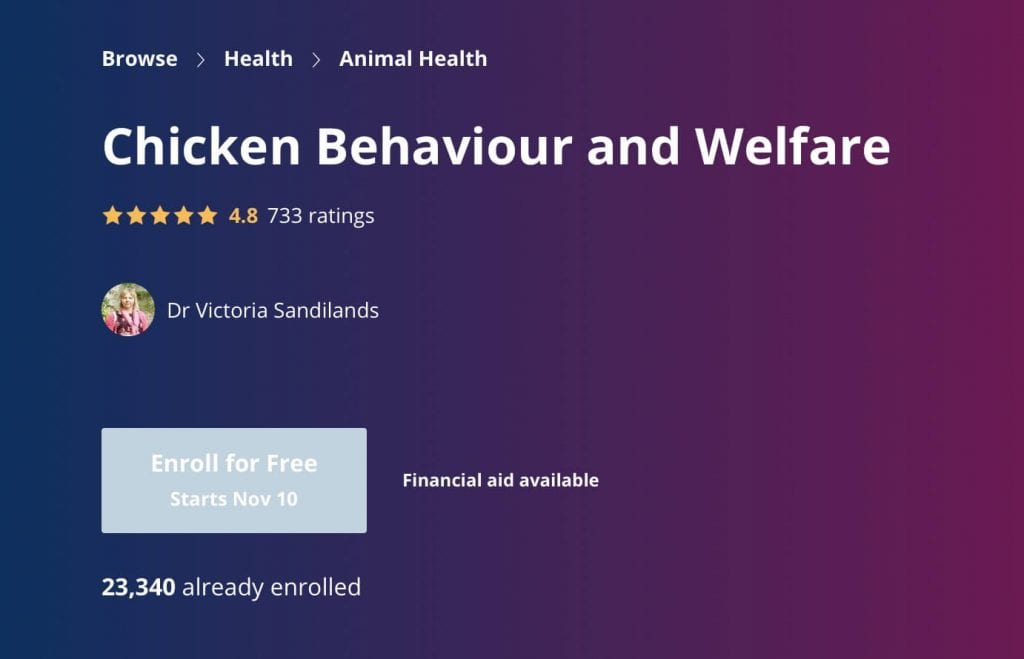
Although some of the course topics may be a little…how do you say…esoteric…Coursera works together with popular schools like Yale, Johns Hopkins University, the University of Pennsylvania, and dozens more.
In fact, Coursera offers quite a few accredited college degree programs, including full masters degrees.

So the platform definitely gives off an immediate “high trust factor” vibe.
First Impressions of Coursera
My first impressions of Coursera were good. The landing page was your standard sales pitch.
That said, the “Join for Free” button captured most of my attention.
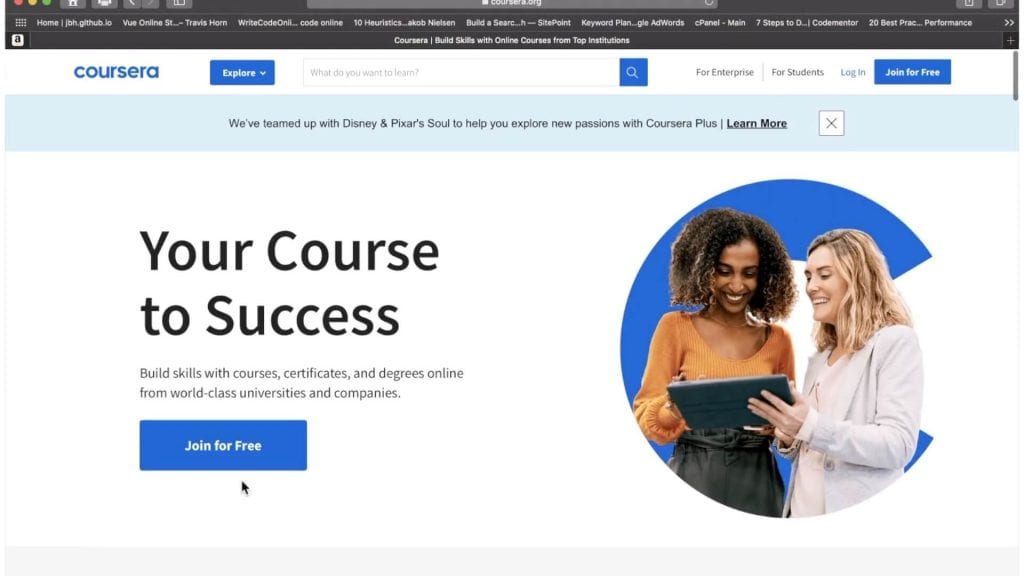
Once logged in, I started exploring my options.
The navigation was decent, and it was easy for me to find the various subjects Coursera offers.
As a software developer, my first couple of clicks naturally landed me on the computer science page.
Coursera Computer Science options
The expensive degree programs from the universities were featured at the top. But scrolling down, Coursera showed me a bunch of various paths, specializations and suggestions.
The ample filter options were a benefit too. The last platform I reviewed (Pluaralsight) didn’t offer a filter option, and it was a hot mess.
But back to the computer science options. Almost all popular computer science topics are offered on Coursera, including:
- Java
- C++
- JavaScript
- Blockchain
- Linux
- iOS
- Data Structures
- HTML & CSS
- And many more.
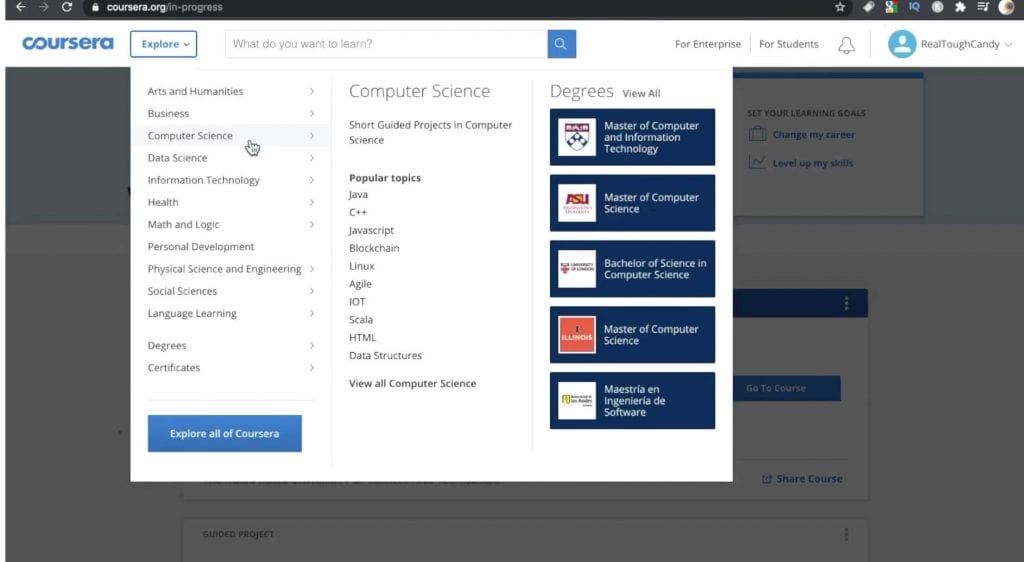
As an aside, there was also a nice selection of data science topics, too. These ranged from Python to Tableau, to TensorFlow and many more.
Now back in the computer science section, there are a lot of courses offered by some pretty well-known colleges, universities and top tech companies. This includes:
- University of Michigan
- Rice University
- Duke University
- Princeton University
- IBM
And more.
Most of the web development courses are designed for newbies. For example:
- Ruby on Rails: An Introduction (John Hopkins)
- HTML, CSS & JavaScript for Web Developers (John Hopkins)
- Modern JavaScript: ES6 Basics (Coursera Project Network)
- Web Application Development: Basic Concepts (University of New Mexico)
- Programming Foundations with JavaScript, HTML & CSS (Duke University)
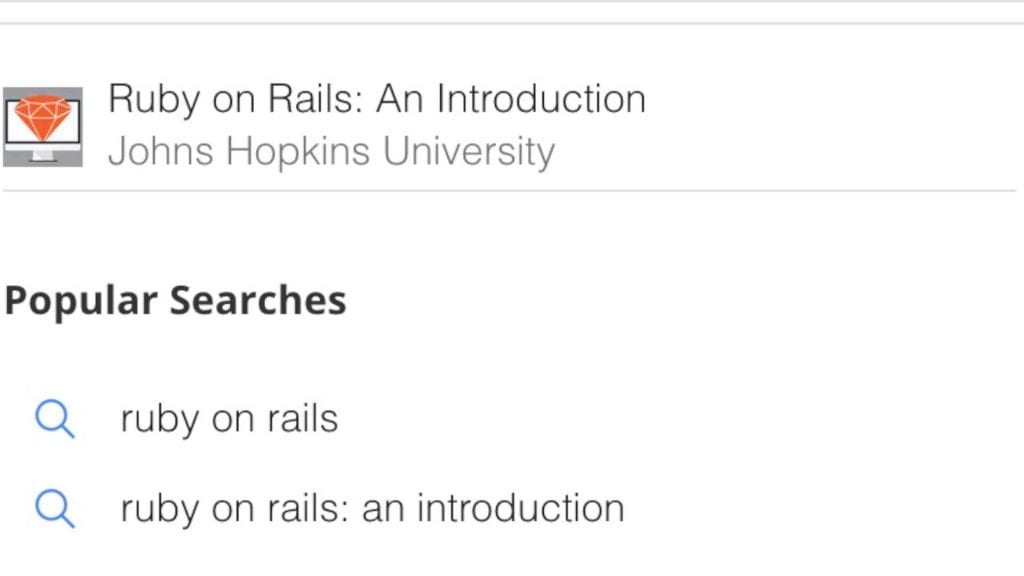
That said, there are some intermediate courses and one or two advanced ones.
But remember, in addition to individual courses there are certificate programs, specializations, and degrees. Each of these contain multiple courses.
If you have a few hours to spare, you can easily get lost checking out the various flavors and combinations of courses.
On the other hand, if you don’t have a few hours to spare, it might be frustrating trying to navigate through all your options.
Course Durations
Coursera lists course durations based on the time it takes for the average student to complete, rather than actual video run times.
For example, in the filter option I can filter courses by months, weeks, or less than two hours.
Coursera Guided Projects (computer science)
Aside from the courses, there is also a section called guided projects.
However, these “projects” aren’t produced by organizations like Duke or Google, but by individuals. Coursera simply bundles these various instructors under their Coursera Project Network.
Also, I use air quotes above because most of them are actually interactive mini-courses where you practice your coding skills.
The concept is pretty cool: Coursera redirects you to an online cloud environment where you’ll get access to a virtual machine.
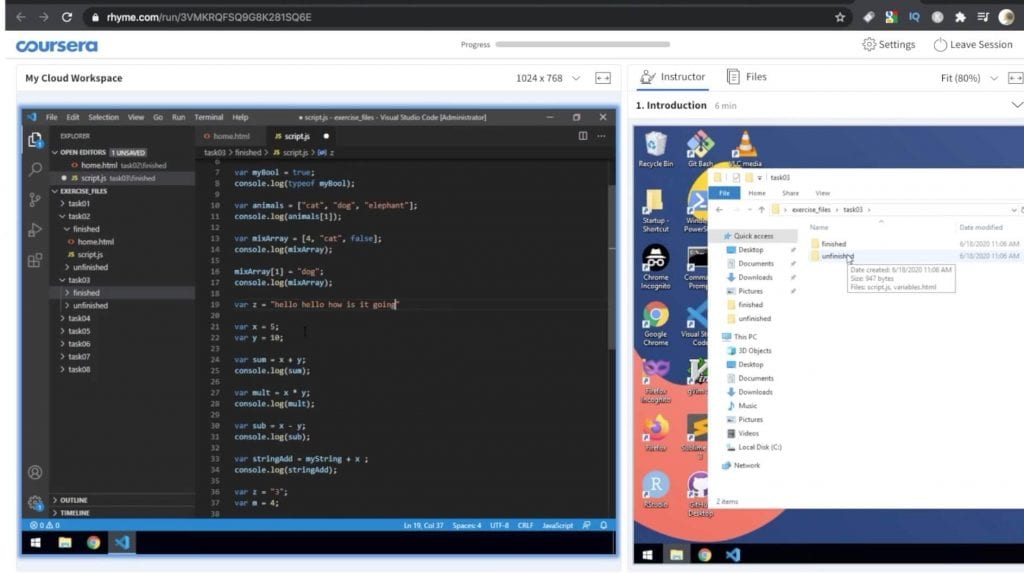
From here, you can not only code along, but also explore the entire virtual machine. So, for example, you can run commands on the command line.
You can run other programs.
You can toggle between programs.
All right in your browser.
To the right of your virtual machine is the lecture window. This is where the instructor shows you how to execute a certain task.
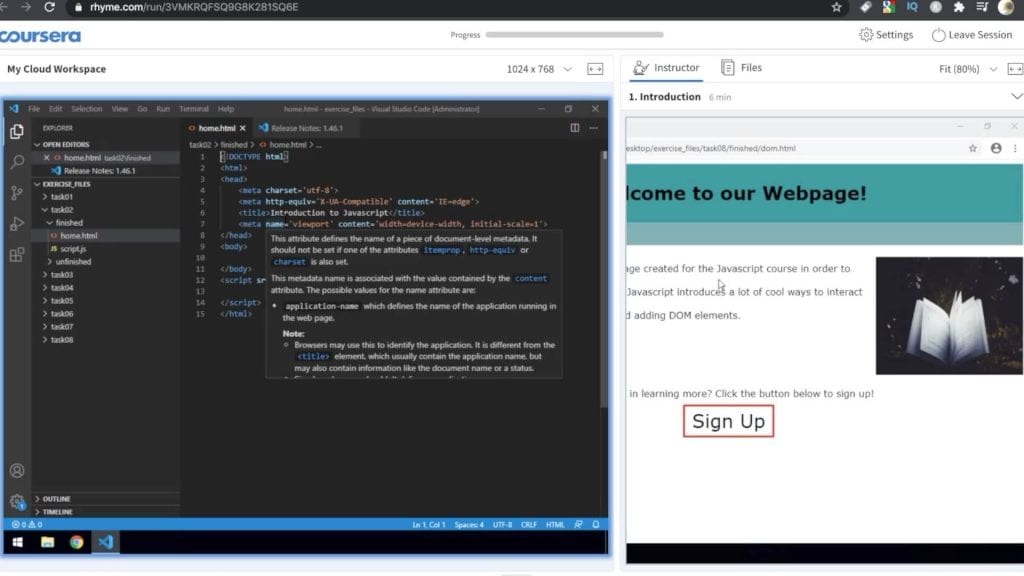
Again, I thought this was a cool feature. But I get into more detail of its pitfalls in an upcoming section.
Is Coursera Worth It for the Price?
Wait, what price?! Coursera is free.
Wait, no. Coursera also costs money.
Well, Coursera COULD cost you money, but you can also hit a little Audit button that will give you a course for free if you’re not in the mood to pay.
Confused yet?
Yeah, me too.
The pricing structure is one of my dislikes about Coursera. I could literally write a 1500-word blog post on the topic of Coursera course prices alone.
Instead, I’ll show you mercy and link to the official payments option page:
https://learner.coursera.help/hc/en-us/articles/209818963-Payments-on-Coursera
I go into more detail about Coursera’s pricing structure below.
What I like about Coursera
Number one, I like the accessibility of courses.
What do I mean?
That AUDIT button, baby.
You can press that little button and BAM! The entire course is available to you for FREE.
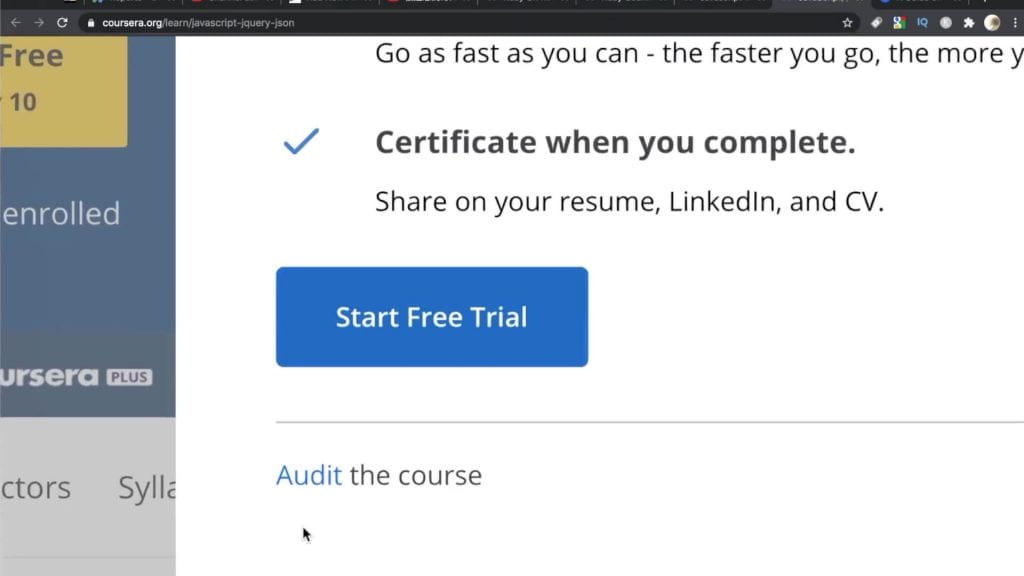
There’s also a financial aid button option on a lot of courses.
So if money’s tight, you can fill out their application and see if you’re eligible. You won’t get an immediate answer, but if they approve you, that gives you access to the extra stuff aside from just the videos.
This includes he assignment submission option, the course certificate, and a few other perks.
Number two, I really like the selection of the courses.
If you’re into continuing education, or if you’re just wanting to learn something for fun, there are some super interesting topics on Coursera.
Number three, I’m really digging Coursera’s cloud workspace for some of the software developer offerings.
You can actually use one browser window to watch the lecture and work on code. You can customize it, move stuff around, access files and of course edit your code right in the browser.
This saves a ton of set up time, sometimes setting up these environments can take hours, it’s super frustrating.
I just love when you can pop open a window and start working on stuff.
What I DON’T like about Coursera
Number one, I don’t like that the course publication dates aren’t listed anywhere.
That’s a little shady. Don’t you want people to know when this thing was released? Even a simple “last updated” tab with a date would be good.
I’ll take anything. I just need some sort of date.
Dates are really important in software implementation.
Working with older releases and versions of software makes your learning environment hell. You spend a LOT of time just getting stuff to work.
Time that could be spent actually learning and working with relevant technologies.
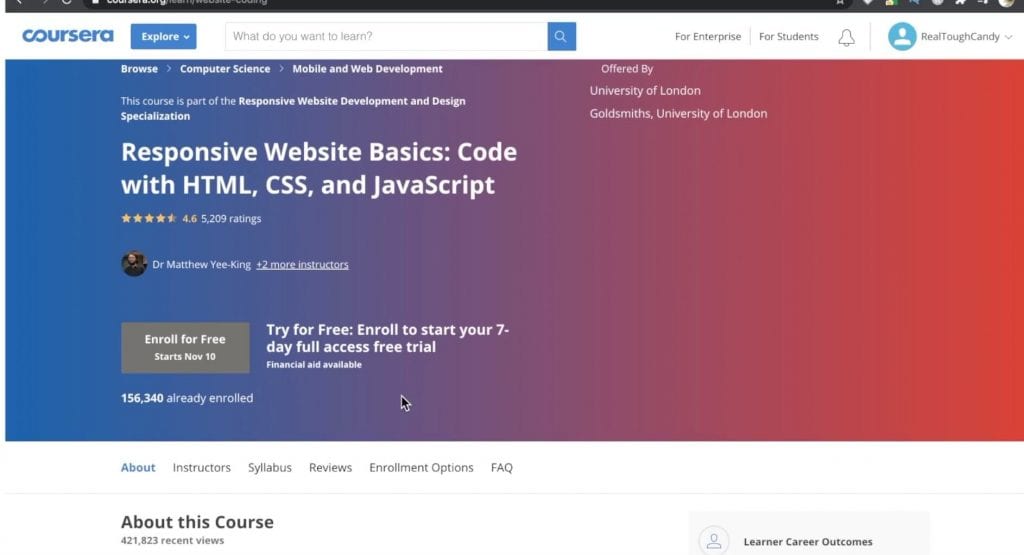
But course publication dates made public or not, once I did start getting in to the curriculum and projects…
The outdated and inconsistent nature of many of these Coursera courses started popping out.
As mentioned earlier, Coursera offers interactive short courses that Coursera calls projects. I don’t know why they call them that, since the ones I saw have nothing to do with a project.
There was a JavaScript project I spent about an hour exploring.
Basically, it’s just you coding along with JavaScript concepts.
Which is cool! But, you do not build a project.
I digress.
Anyway, for most of this project you’re working with ES5 stuff.
And then for like five minutes at the end they show you two things related to ES6. It’s just really patchworked together and inconsistent.
It’s almost like they recorded it in 2015 and ES6 came out in and somebody in the faculty lounge was sipping on a macchiato like, “Yeah Barb, better throw in that thing about fat arrow functions in at the end.” 🤷
And then in the written portion the author refers to getting your hands dirty with React as part of the project, course, whatever you want to call it…When React isn’t even touched upon in the entire project.
Erm, wha?
Inconsistencies like those that add up, and ultimately take away from the learning process.
At that point Coursera started lacking authority and reliability.
Which is probably not the tone they’re shooting for when some of the world’s most respected colleges and universities have signed on to the platform.
But on the bright side, this isn’t an unfixable problem. I think a good proofreader and some bits of editing (and updating) would really improve the value of Coursera.
Heaven knows I have my share of typos and mistakes with all the stuff I publish, so I get that.
But…
According to Forbes, Coursera is worth over a billion dollars.
They can afford a few course testers and some editors.
Come on Coursera.
Let’s see that upgrade.

As the saying goes, you get what you pay for.
And with the audit option, you don’t have to pay a nickel for a lot of this but still. . .If I was a paying customer on the monthly plan or the Yearly Pro plan or whatever else plan, I would not be satisfied with a lot of the guts of these courses. The protein is kinda falling apart in places.
Finally, the last big thing I didn’t like on Coursera is the pricing structure.
Coursera’s pricing structure is too confusing.
Some courses are free.
Some are not.
Many let you to audit them so the videos are free… But again, the extra stuff like submitting assignments and earning a certificate isn’t.
And if you don’t like those options you can also do Coursera Plus.
And if you don’t like that option you can apply for financial aid or a scholarship, but not all courses have those…
You can also prepay for an entire Specialization or you can pay month by month…
And I’m sure I’m missing seven or eight other options.
OK, I admit, I do appreciate the flexibility. But it again comes back to the inconsistencies of Coursera.
I think there are too many inconsistent pricing options with the thousands of courses.
It’s just not organized in a way that makes sense to me.
I’d like to see a quick side by side comparison of the pricing plans with check marks or something, to see what features are included with each pricing plan.
Kind of like what Pluarlsight does. Where you can take a peek and do some fast comparisons.
I don’t want to poke around for an hour trying to figure out all my plan and payment options.
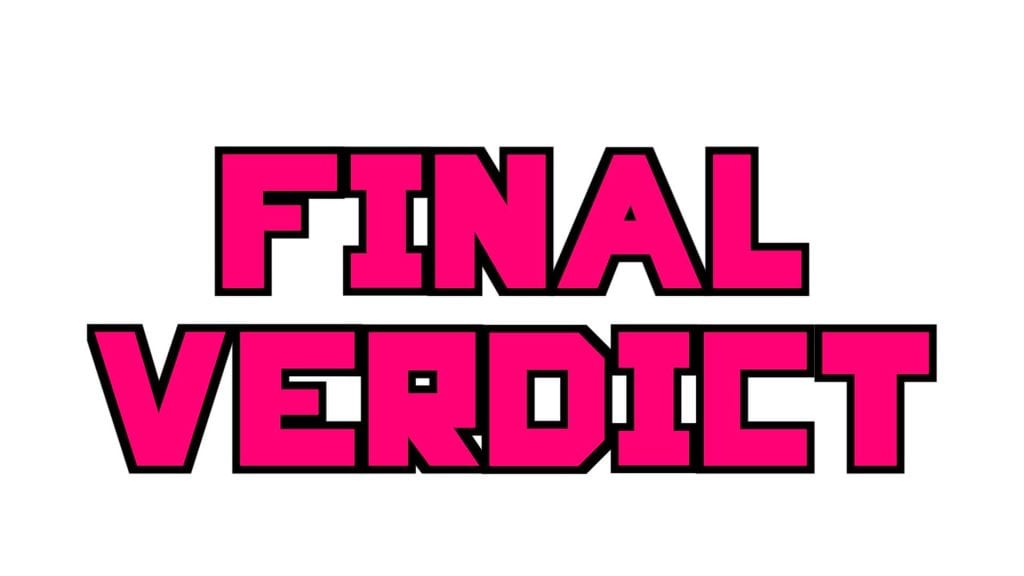
Final Verdict: Is Coursera Worth It?
Is Coursera worth it for software developers? All in all, for software developers in particular I think Coursera is below average.
Some of the individual courses may be worth it, but overall as a platform, I would explore your other options before making a long term commitment.
I think Coursera’s strongest suit isn’t the material itself, but the perceived trust factor.
For example, when you have places like Johns Hopkins and Duke sign on, it’s a lot more legitimate in the eyes of potential employers and clients compared to Joe Schmo’s Platform of Computer Hotness.
If Coursera can fix the bigger issues I mentioned earlier – the course publish dates, the course review system, the inconsistent course quality, and the zany pricing options, this platform would be awesome.
Is Coursera worth it for non-software developers?
I think Coursera can be a good transitional platform for people in general who are used to learning in a live classroom setting. . .But for whatever reason are now having to get into online learning.
You know, if you’ve never done online learning before, it takes a lot of work. And a lot of these platforms are very DIY (do it yourself), where it’s 100% on you to figure everything out.
But from the courses I checked out, Coursera has a pretty good onboarding process.
All their courses I’ve explored had fairly decent introductory videos and oftentimes syllabi so you know what to expect. So that helps make the transition easier too.
If you liked Is Coursera Worth It, check out my next article: What is RealToughCandy.io?
Is Coursera worth it this year?
Is Coursera worth it for software developers? All in all, for software developers in particular I think Coursera is below average.
Some of the individual courses may be worth it, but overall as a platform, I would explore your other options before making a long term commitment.
I think Coursera’s strongest suit isn’t the material itself, but the perceived trust factor.
For example, when you have places like Johns Hopkins and Duke sign on, it’s a lot more legitimate in the eyes of potential employers and clients compared to Joe Schmo’s Platform of Computer Hotness.
If Coursera can fix the bigger issues I mentioned earlier – the course publish dates, the inconsistent course quality, and the zany pricing options, this platform would be awesome.Is Coursera free?
Yes and No. There are thousands of courses available for free when you select the “audit” button on the individual course page. This will give you access to the course, but not the certificate of completion (or other perks). You can also apply for a scholarship or financial aid. However, you CANNOT audit specializations or degree programs.
Is Coursera self paced?
Yes and no. The majority of Coursera courses have a suggested schedule plus deadlines, but they aren’t strictly enforced. For example, you won’t get a penalty if you submit an assignment after a due date.
Are Coursera courses accredited?
Yes and no. Coursera itself is not accredited. However, most of the colleges and universities that provide courses on the platform ARE accredited. Whether you are able to earn college credit for the course (and transfer that credit) depends on the individual course. Be sure to read the course landing page and ask questions before enrolling.
